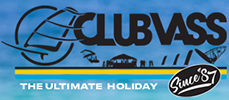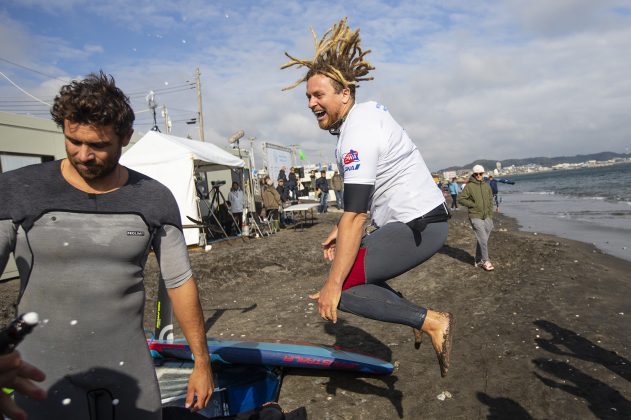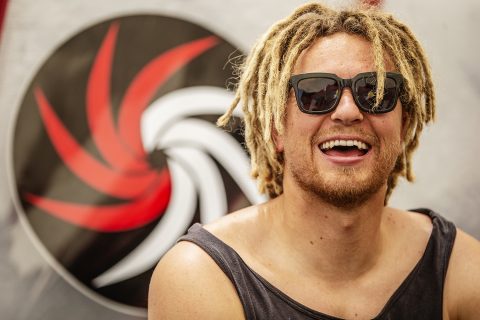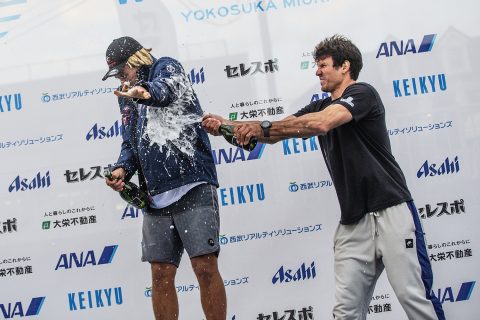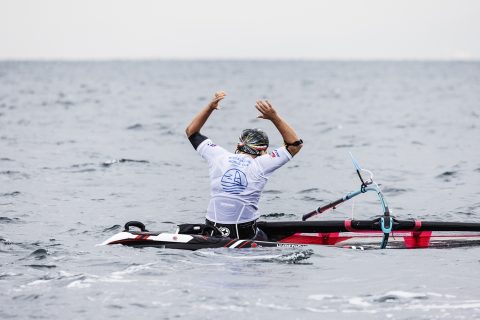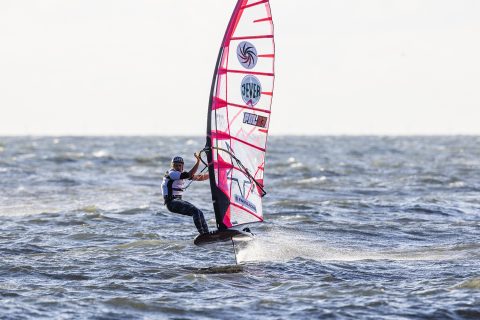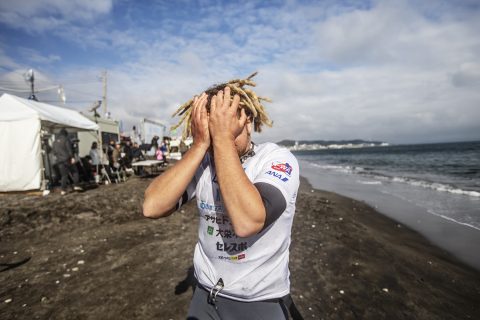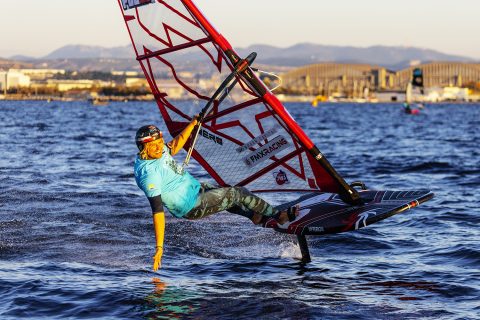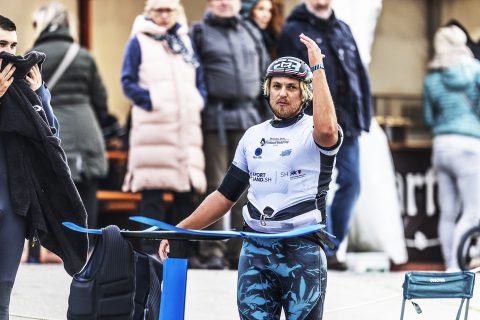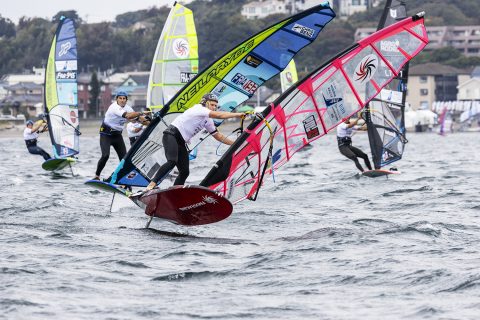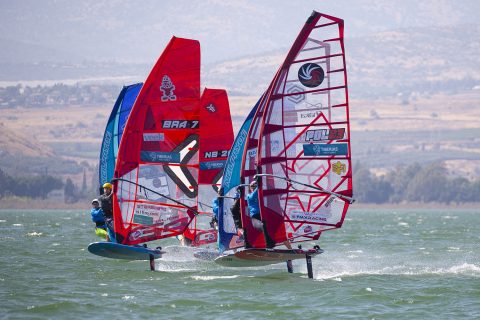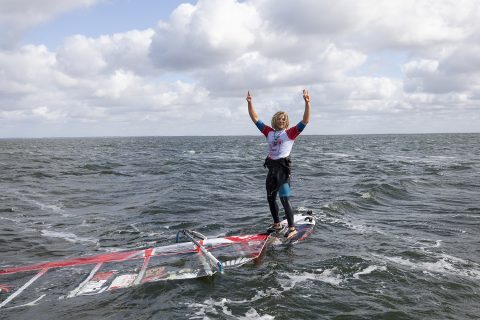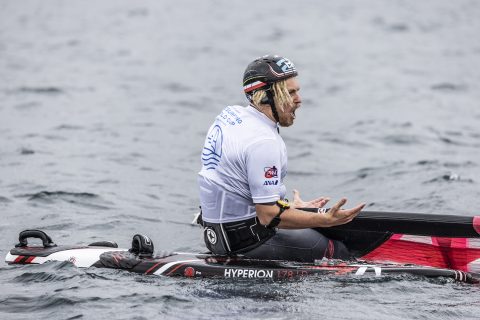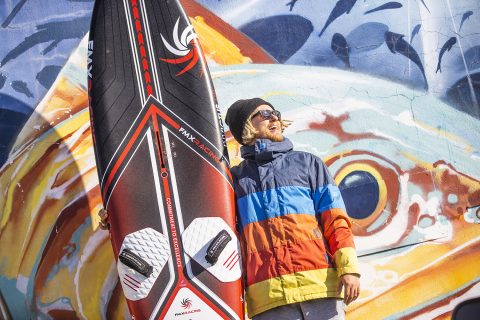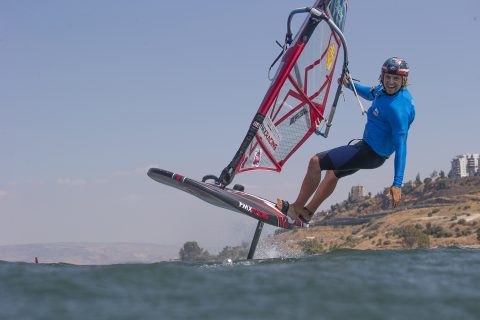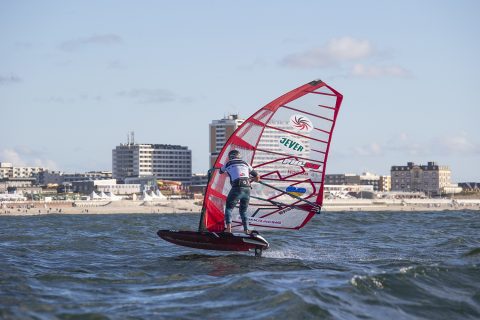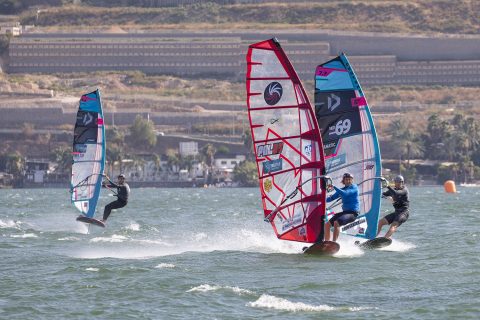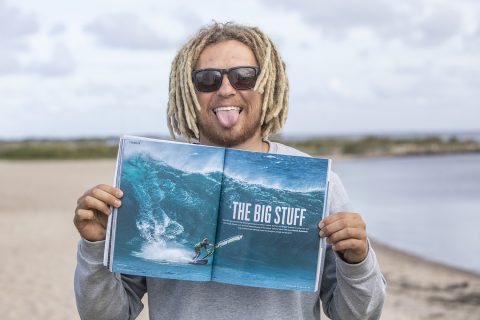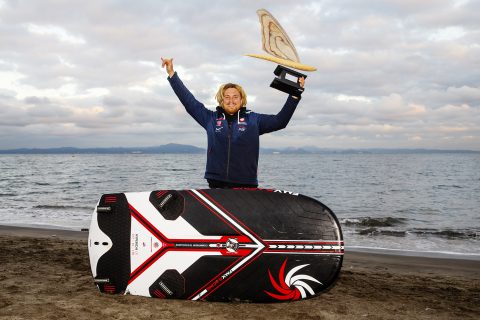MARK OF A CHAMPION: MACIEK RUTKOWSKI
From the days of sleeping in equipment tents at events, because he could not afford a hotel room, to becoming the 2022 PWA Slalom World Champion, Maciek Rutkowski has come a long way. John Carter caught up with the Polish racer to hear all about his road to success, inspirations and training secrets.
PHOTOS – John Carter / pwaworldtour.com // WORDS – Maciek Rutkowski
JC: Tell us about that last day in Japan when you won the title, how that emotional rollercoaster scenario played out?
- Maciek Rutkowski
MR: Yeah I came into that final day feeling really positive and knowing exactly what I needed to do. I made the first step by nailing the start of the quarterfinal. I remember rolling Johan Soe and Bruno Martini from the top just soon enough to still have a good safe line into the gybe and exited high and tight. So just as I was eying that line, and about to unhook, the board just stopped dead! I had hit something in the water, I could not believe it! Not on that day in that moment! Not like that I thought. The impact broke the boom and the UJ, so when I popped up, I saw the guys sailing away and my board separated from the rig. I was sure that was my title hopes floating away right there!
- Maciek on the podium
JC: Looking back do you feel a bit bad about your reaction back on the beach after you crashed, or was that just your competitive side boiling to the surface?
MR: When I watched the clips back, I did feel a little embarrassed. I was crying in the water, but then head judge Pick Escribano, was the one bringing me back to the beach. So I asked him angrily, “Do you think that’s fair running a title showdown in 5-9 knots with shit floating in the water?” He didn’t reply because what was he supposed to tell me?
- Emotional moments
So, I asked him again and again and the more he didn’t reply the angrier I got at the whole situation. So when they dropped me at the beach I was fuming. And there were about ten cameras waiting right on the water’s edge. I guess subconsciously, I knew they wanted drama, so without thinking I just gave it to them. From a personal standpoint, it’s not the best because I worked really hard to not get too high on wins and too low on losses and I feel like every time you lose your shit like that you kind of need to start working on it all over again. But I’m a huge sports geek too, and from that standpoint, I guess to everyone else, it was amazing ha-ha! It’ll make a great documentary and Paul van Bellen’s, YouTube skit of it might be one of the funniest things I’ve ever seen. I only wish I looked a bit more intimidating – I am not very scary when I’m angry ha-ha!
- Racing in Sylt
JC: What was going through your head during the final when you were helplessly watching in the live tower?
MR: I didn’t have much belief to be honest. Matteo has been there many times and he definitely has a superior track record in those ‘critical’ situations over Nico Goyard who rather dominates on speed than pure racing and Enrico Marotti who can be very up and down at times. But I underestimated the gravity of the moment I think. Enrico really wanted it and didn’t have much to lose, he was going to be on the event podium regardless, which he had never done before. The conditions were quite similar to his home spot and he was in a good rhythm. So, when I saw him fight Matteo Iachino for the pin-end and take that position the first glimmer of hope came. And when I saw Nico nail the start in the middle, another little spark popped up. Johan Soe was also a factor because if he finished top three, he would overtake me in the event standings and that was it for the title as well. But he had a horrendous start as well as Matteo. But then he had an amazing first gybe and came into 4th right on Mateus Isaac’s heels! It was light and I know Mateus uses a very small foil for straight-line speed but a little touchdown in the gybe from him would mean “bye-bye-world-title” again. So just that one heat lasted hours for me. And when they crossed the finish line I didn’t dare to celebrate. But technically I won the World Championship sitting in the commentary booth!
- The result is announced
JC: Do you feel you have worked for this title more than any of the other guys?
MR: I am not sure about more. I think from around 2014 until 2018, I worked crazy hard, by far the hardest of anyone on tour. But then I shifted to trying to work smarter. Really identifying the key areas, looking for big improvements, trying to reinvent myself every year, but keeping in mind that it’s not just preparation that wins you heats. Preparation only helps you execute when the time comes. So, I really focused on execution. On having consistency all event long, on cutting down the major mistakes first, before really working on the details. And making sure I ticked all the boxes. The way I see it, it is like a FIFA game card, if you’re a 99 in one category, like for example straight-line speed, it does not mean shit. You’re much better off being an 85-88 in all categories. And even then, you still need to go out there and execute. It’s a crazy complex game, but I love it!!
JC: Did you fly home first class?
MR: I upgraded to business. I didn’t even dare to ask for first, I’m a windsurfer after all! The flat bed seat was nice; I slept twelve out of thirteen hours, but still arrived in Warsaw destroyed. The emotional toll was insane, and the Japanese booze didn’t help either ha-ha!
JC: What was the reaction on social media and back in Poland?
MR: Crazy. I try to stay connected and really appreciate all the fans and followers, always trying to share as much as I can. So, I made it a goal to reply to every single message, read every single comment, not turn down a single interview no matter how small or unknown the media entity was. Just the social media took me forty-eight hours! And then when I landed in Warsaw, the media circus started. It’s crazy how little a title like this, changes how I perceive myself versus how other people see you. Now everyone wanted a piece and I almost feel obliged to give it to them. But the highlight was the party I quickly threw together for the weekend of my arrival. I rented a club, opened a tab, and invited all my friends, the close ones and the ones I hardly see. We talked about Japan for maybe twenty minutes and then it was just friends hanging out, enjoying themselves, getting hammered. I wish there was an excuse to do that every year!
JC: How important was your equipment this season? Working with Finian Maynard on the FMX boards and with the guys at Challenger Sails.
MR: Equipment is very important! Also the foils, which I am not sponsored for. So, the chances of getting “the special stuff” are pretty much non-existent. I am just a customer where foils are concerned! So I need to make sure that I cover that gap with boards and sails. I am super involved in the R&D and the efficiency we have in both programs is insane. I overheard the Severne guys talking about prototype v9 vs v10 and I was thinking to myself, if I get a v3 I’m stoked! We are really operating on much thinner budgets and to win a world title like that, it’s just a massive stamp of approval for the creativity and efficiency of the FMX and Challenger development programs. I am especially proud since I have been with FMX since day one and with Challenger for five years now. It’s such a good feeling of rising through the ranks together and really accomplishing winning this title as a team.
JC: How important is it to you to be the best at what you do?
- Maciek cruising
MR: I think it’s natural that the better you are, the less it matters to you, it just sort of feels normal. Or maybe you just don’t think about it much, you just act. I analyse a lot and I try to always find the shortest way to my goals. Hard work, dedication, sacrifice, blood sweat and tears are all glorified in sports and of course you need that. But if you do that in the wrong direction you might end up losing to a lazy person! This is why the top guys in slalom are often on top for a while. They figured it out, they know their way around the business; they just know how to do it. I’m not claiming I know, but I definitely feel like I’m closer to figuring it out now!
JC: Can you describe a defining moment in your life or career that impacted who you are today?
MR: I think there were many. My dad showing me the, “Do whatever is needed” approach to competition. Also winning a youth world title gave me a sponsorship that dragged me through my first years on tour when my results sucked. Quitting university was a ‘Letter of intent’. Quitting the wave tour gave me no more excuses of trying to be an all-rounder and really put my focus in the right place. Hiring the right sports psychologist after a two-year search was a huge step in understanding myself. Getting second in foiling in New Caledonia opened the door to NoveNove, which led to signing with Challenger and a year later when Finian was leaving NoveNove he took me with him. Winning my first final in Denmark gave me my first podium and made me believe that I can actually achieve results. Winning in Croatia showed me I can beat anybody. All those things happened and led me to where I am today. I sometimes wake up in the middle of the night freaking out where I would be if one of those things didn’t happen. Then I need to tell myself ten times I would find a way anyway and I can get back to sleep.
- Frustration in Sylt
JC: Do you have any other athletes that inspire you?
MR: So many. Michael Jordan was an early one – competitive drive, crazy swagger. Josh Stone and Polakow really fuelled my love for windsurfing with their VHS tapes. Antoine Albeau was too good to be true. Peter Volwater was so good all-round and such a fun guy to be in the company of. To be honest, I follow a lot of sports and a lot of athletes and whoever maximises their potential and finds their own way of doing it is an idol and an inspiration to me!
- Race mode
JC: What were the best and worst decisions you’ve made in your professional windsurfing career?
MR: I think the worst was not realizing I needed to be on good gear as early as possible. Then you have a chance to get results and get granted access to even better gear. Sometimes it’s worth going for it, even if you need to borrow the money. So, along those lines, best would be signing with my current sponsors and hiring a mental coach after two years of looking for one. Of course there was many more, but without these two there wouldn’t be the title for sure.
JC: Do you have any inspirational quotes or words to live by?
MR: Don’t eat yellow snow!
- Israel foil action
JC: What’s your definition of life balance?
MR: It’s very important, even if I’m not sure that I have it. I really try to separate who I am from what I do for a living. Windsurfing and racing are my passions, but you can’t live and die by your results and let them affect your personal life. This is my job, it’s the best job in the world, I’m fully submerged into it, but when I come home to my girlfriend, I don’t want to talk about it any further. A lot of my friends are not windsurfers, don’t have a clue what a foil is, and I like it that way! I guess I would love for people to see me as a good, funny, slightly weird guy first, rather than a windsurfer or a world champion for sure.
- Race victory in Denmark
JC: What motivates you to go on the water each day?
MR: Every day is different. Test this batten, try this mast, do better then you did yesterday at gybing, prepare for this contest, visualize these conditions etc. I have to admit very rarely I go strictly to have fun on the racing gear, but once I’m out there, 9/10 times I’m having fun. So the job gets me off the couch, but the passion keeps me in the water. I rarely come back in at the time I planned; I always stay out longer, unless the wind shuts off.
- Japan tension
JC: How do you deal with stress and competition nerves?
MR: As evidenced by the epic meltdown in Japan, not so well ha-ha!! Nah, to be honest, together with my mental coach, we didn’t really manage to decrease the level of stress, but we managed to learn to interpret it differently. If I am stressed it’s because I’m excited and I’m doing something I care about. Otherwise, I would not be able to give half an F! If you and me race for 150th in the world you would probably win!
JC: Do you thrive on being in the heat of the moment or under pressure?
MR: Yes, I think so! That’s the flipside of the thing I mentioned in the previous question. I chase those moments that get me really out of my comfort zone. I love the feeling; it is a bit like a drug, and you can only get it again if you move that limit even further. And more times than not I come out on top from these situations. PWA Denmark 2019 comes to mind, where coming into the last day I was in third tied with Ross Williams and Julien Quentel – probably two of the most dependable guys that get results always and out of every situation. I was super nervous, but got to the final, and with Ross out managed to not only match race Julien, but also somehow get my first win in a final. Out of these three guys, you wouldn’t have bet a penny on me, but I wanted it really bad and managed to perform when I needed it the most – as a fan you love to watch those moments, and as an athlete those are the ones you cherish most, when you know you were at your real 100% in that very moment.
- FMX moment in France
JC: What are the things that you enjoyed most about competing at the top level of windsurfing?
MR: Competing at the top level of windsurfing, that’s exciting in itself. I’m a competitive person, so that can be enough on its own. But also, the format we have is amazing. You are racing the best guys head-to-head, sometimes centimetres away from each other, there are no rules, the best guy will win, no ifs and buts. You can’t cheat it. You can only face it, lose a million times and hopefully win once. And believe me, it’s worth it.
- Maciek on the foil
JC: What are your strengths as both an athlete and a person?
MR: I think I have a bit more drive than a regular Joe. I am slightly obsessive. My test partners all hate me because I always want to go until sunset or until there is no more wind, my sail designer Claudio sometimes hates me because I push him so hard. Finian and I had a few shouting matches because I demand the best of the best even if technically he’s the one that employs me ha-ha! So yeah, I don’t exactly stop before I reach my goal and now that I have, I see that I probably won’t slow down before the next one… or maybe the one after that.
- Gybing in Sylt
JC: Did you keep your distance from rivals during and away from events?
MR: We’re all friendly for sure, but it’s not like you can really be best friends 365 with somebody from the tour. You need to realize you’re not there to make friends and live with it. It might happen, might not. I usually describe the tour as a family. There’s the cousin you really like and the weird uncle you can’t stand, but if any of them are in trouble or need your help you’ll do absolutely anything to help. And then probably with time you’ll look at those relationships quite fondly, but in the heat of battle somebody can become an enemy very quickly.
JC: Who did you respect and enjoy competing against the most and why?
MR: I try to focus on myself, but there are so many guys I respect for so many different reasons. Matteo just is always there, always well prepared, always ready to race well. Enrico is crazy fast, super tuned up. Amado is scary talented and Goyard on his day is the best foiler in the world by far. You go down the ranking list and you’re like, “Dam, I really did amazing, if I’m in front of this guy or that guy. Oh, and this guy, are you kidding me?” Even Antoine Albeau finished 13th in 2022!
JC: Who out of the current crop of pro windsurfers do you admire and why?
MR: I love watching Brawzinho. I think he has a similar obsessive drive to mine, just way more talented and in something much more aesthetically pleasing ha-ha! From the racing I try to watch others closely and pick out things I can implement into my own game. But I admire all the guys I listed before and more!
JC: How do you escape or shut off from being a pro sailor?
MR: I just try to do normal stuff. Watch a movie, listen to music, and talk to people outside of the bubble. Connect to the real world. And then when I am rested enough, I love to create stuff. Whether it be a podcast, a song, or even some sort of graphic or whatever I love, just giving that creativity some time to show off, it’s super satisfying.
JC: What’s more important winning or money and why?
MR: Winning will get you money, but money won’t get you winning, so for me it is easy, winning!
JC: What’s your power foods? What do you eat to keep up energy for training, breakfast, dinner, snacks etc?
MR: I am not much of a foodie; my girlfriend complains how practical I treat eating. Eggs of any kind are usually present at breakfast, then I probably look to get enough protein and carbs in rather than how the food looks. Although I do like good fish, sushi, bowls, avocados, berries, Polish soups and Italian tiramisu. Preferably not all in one sitting.
- Slalom in Israel
JC: How much do you think of your talent is natural or from hard work?
MR: I don’t consider myself crazy talented. I think we often misjudge talent for smart work put in early, when kids are young. And I did start young and think I did the right things, although more freestyle would probably help! I wanted to become a freestyler but there was no one to really teach me and we didn’t travel all that much. But I do think I have a ‘talent’ for working hard. If I care about something, I’ll commit 100% and that could be my edge.
JC: How many hours on the water training do you do in a week and how many off the water in the gym or running etc?
MR: It varies a lot, depending on the period. During winter preparations it can be four to five hours in the water, followed by two hours in the gym. But when you compete you need to be fresh. When I was younger, I was arriving to contests kind of tired, not super hungry. Now I know how to fuel the fire, that even after a hassle trip, like they all are, I can arrive at the competition site and have good energy.
JC: What was your ‘Rocky’ moment – when everything was going wrong and then you turned it around and won?
MR: Wasn’t it Japan? I mean I didn’t turn it around myself, but it’s definitely the one moment that could anchor a Rocky-like film for sure!
JC: Did you ever dream you would be slalom world champion when you quit university back in the day ten years ago?
MR: Yes. But for it to go from dream to goal and then to reality, a hell of a lot of things must have happened, and I’m absolutely elated they did. This whole title still doesn’t really feel real.
- Not just a racer
JC: Not only did you train hard the last few years, but you also put a lot of time into your video and social media output, tell us why you put the time into this area and how much work it is?
MR: I remember my first ever meeting with a certain energy drink sponsor. The guy told me straight, “If you land the triple forward, but it is not on video, nobody cares”. And that was 2011, so I quickly understood the value of what on tour is so fondly called “media whoring”.
Luckily with today’s platforms and tools the subject controls the narrative almost entirely and the “whoring” part turned more into “creating”. So, it is much easier, but in a way much harder to stand out! Creativity and ideas are really at a premium. I always had ideas, but the biggest limitations are time and budget. I would never sacrifice training for content creation, and it takes a lot of time and budget, to put out quality stuff regularly, so it gets difficult at times!
Social media can be done with minimal effort, but who wants to see another picture of going straight captioned with, “great session with 7.8/115 with a 37 fin”? I don’t! And to do something more interesting you need time and a touch of creativity. So, then I got inspired by some podcast interviews with interesting people I was listening to on many of my long drives. I called up Ben Proffitt saying, “Man you got to do a windsurfing podcast, it’ll be great!”
He told me I should do it, which I found ridiculous because my English is somewhat limited, but after some encouragement, I finally gave it a go. And it’s been one of the best experiences ever! I got to talk to so many people I would not have otherwise and had a chance to ask them all the things I was always curious about!
Of-course scheduling is always a pain and after the second time I got up at 5 a.m. for my childhood hero Josh Stone to not show up again, the enthusiasm dwindled a bit, but overall, it has been super fun! We did over fifty episodes and will do more in 2023 for sure. Encouraged by the success of that I went on to invest in my YouTube channel. I flew my guy Kacper out to Tenerife, we filmed a bunch of stuff, then I filmed in other locations with other people, and he edited, and we managed to have a pretty good run of six months’ worth of weekly videos.
The channel grew, but not to a level that I would break even on it and with Kacper not being able to travel much anymore, I’m not sure what the future holds for this project. But on the back of that we filmed a lot of what was happening behind the scenes in Sylt and Japan, and I am planning to release a proper documentary about the title race sometime in 2023. So one thing leads to another, and you never know which door might open next. I’d love to share my passion for a living. Robby Naish told me in our windsurfing podcast interview that if there was a way to measure it, he would sponsor the rider who shares the stoke the most. And I guess that’s what I am trying to do. Now I can only devote probably 15% of my time to it, so I’d like to think I could do it pretty good once I’m done racing, let us see!
- The all important PWA wing!
JC: What do you think the future holds for you once you are done with racing?
MR: For now, I’m fully devoted to racing. I know I can still get so much better in so many different aspects of our craft. Once I’m done, I’d like to stay in the sport. It would be super cool to coach a young guy and lead him through all the challenges I had to figure out myself. Managing a team for a brand could also be cool. Product development is fun. Helping the PWA to grow the sport would be fulfilling for sure. Then there’s content creation, events, and some other opportunities I’m cooking up in Poland. Then there’s also my bucket list of waves I’d love to ride and never got the chance to yet – Fiji, Reunion, Indo, just to name a few. I think it is safe to say I won’t be bored in the first few years of retirement. Who knows, maybe one day I’ll even be able to sit still for a few hours, that would be a huge achievement alone!

